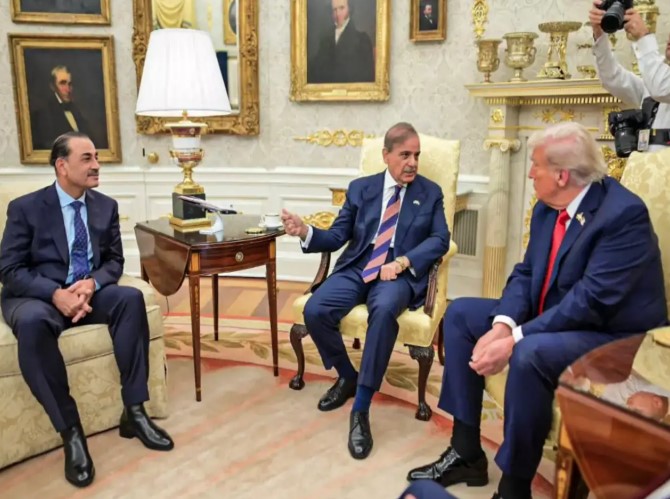The United States firmly denied media reports claiming that it would give Pakistan new Advanced Medium-Range Air-to-Air Missiles ( AMRAAMs ) under a recently amended defense contract. In a statement released on Friday, the US Embassy made it clear that the modification only relates to the sustainment and spare parts support of existing systems and does not involve any new missile deliveries to Pakistan.
US Clarifies: No New AMRAAM Missiles, Only Maintenance Support
According to the embassy, the announcement made by the US Department of War on September 30 referred to “an amendment to an existing Foreign Military Sales (FMS) contract.” The purpose of this amendment, officials said, is to provide maintenance and logistical support to several countries that already use such systems — Pakistan being one of them.
The embassy stressed that the contract “does not include any new weapons.” It further clarified, “The Administration would like to emphasize that contrary to false media reports, no part of this referenced contract modification is for deliveries of new Advanced Medium-Range Air-to-Air Missiles (AMRAAMs) to Pakistan.”
U.S.-Pakistan relations soar as Washington considers transfer of AIM-120D advanced missiles
This clarification comes after days of intense speculation by regional and international media outlets suggesting that the US was planning to strengthen Pakistan’s F-16 fleet through the supply of new AMRAAM missiles.
Reports Sparked Regional Speculation
In recent days, several publications reported that Pakistan was likely to receive advanced AIM-120 AMRAAM missiles from the US. Such reports suggested that the potential delivery could significantly enhance Pakistan’s air combat capabilities and potentially shift the aerial balance of power in South Asia.
The AMRAAM is one of the most sophisticated radar-guided air-to-air missiles in use today. Known for its precision and effectiveness, it is capable of targeting enemy aircraft beyond visual range. The US has supplied these missiles to many of its allies as part of defense cooperation agreements, leading to speculation that Islamabad was the next in line to receive them.
However, the US government’s latest clarification has effectively ruled out any possibility of such a delivery at this stage. “The sustainment does not include an upgrade to any of Pakistan’s current capabilities,” the statement from the embassy read. This indicates that the amended contract is purely for maintenance and operational support, not for expansion or improvement of Pakistan’s existing weapon systems.
This clarification holds importance in a region where military balance remains a sensitive issue. Even small developments in defense cooperation between major powers and regional actors often attract widespread attention and debate.
The reports also drew attention because they appeared at a time when Pakistan’s relations with the United States seemed to be warming after years of ups and downs. This context further fueled speculation that Washington might be reconsidering its defense engagement with Islamabad.
Political Context Behind the AMRAAM Missile Reports
Part of the reason the rumors gained traction was Pakistan’s recent high-profile visit to Washington. Prime Minister Shehbaz Sharif and army chief General Asim Munir met with US President Donald Trump at the White House, marking one of the most closely watched diplomatic meetings between the two nations in recent years.
Bitcoin pact stuns IMF—Pakistan and El Salvador defy oversight with Bitcoin pact
During their visit, Pakistan’s leaders reportedly presented rare earth minerals as a symbolic gesture to highlight potential economic cooperation. However, the move drew mixed reactions back home, with some Pakistani lawmakers mocking the presentation as unnecessary showmanship.
Adding to the attention was President Trump’s claim during the visit that he had previously “saved millions of lives” by stopping a potential nuclear conflict between Pakistan and India during his earlier term in office. Trump said, “The prime minister of Pakistan [Shehbaz Sharif] was here along with the field marshal [Munir], who’s a very important guy in Pakistan. He said to a group of people, ‘This man [Trump] saved millions of lives because he stopped the war from going on.’”
The US President’s comments quickly became the subject of intense discussion, both in Washington and in South Asia. They appeared to reignite memories of heightened tensions between Pakistan and India in previous years, when fears of escalation were particularly high.
In June, Pakistan had even nominated Trump for the Nobel Peace Prize for his claimed role in preventing war in the region. This nomination further added to the perception that Pakistan was seeking closer diplomatic ties with the United States after years of strained relations.
Against this political backdrop, the appearance of reports suggesting a new missile deal only intensified speculation about a potential US-Pakistan defense revival. However, the embassy’s statement now confirms that no such deal exists and that Pakistan’s current defense arrangements remain unchanged.
Official Stand: Only Sustainment, No New Capabilities
The US government’s repeated emphasis on “no new capabilities” is seen as an effort to ensure clarity in how its defense cooperation with Pakistan is perceived internationally. The embassy highlighted that the current support package simply ensures that existing systems like the F-16 fleet can continue operating effectively, without providing Pakistan with any new or enhanced strike abilities.
Strategic disaster – Trump betrayed America’s India ties for family business in Pakistan
In essence, the US decision is part of a broader routine of maintaining older defense equipment sold through earlier programs. It is not an expansion of Pakistan’s firepower.
While media speculation often arises around updates to defense contracts, the US clarification aims to prevent misinterpretations that could lead to unnecessary regional tension.
By reaffirming that the contract amendment involves only sustainment and spare parts — and not the sale or transfer of new AMRAAM missiles — Washington has made its position unmistakably clear.
This detailed response from the embassy is expected to put an end to the confusion stirred by recent reports and ensure that all parties understand the limited scope of the contract modification.

